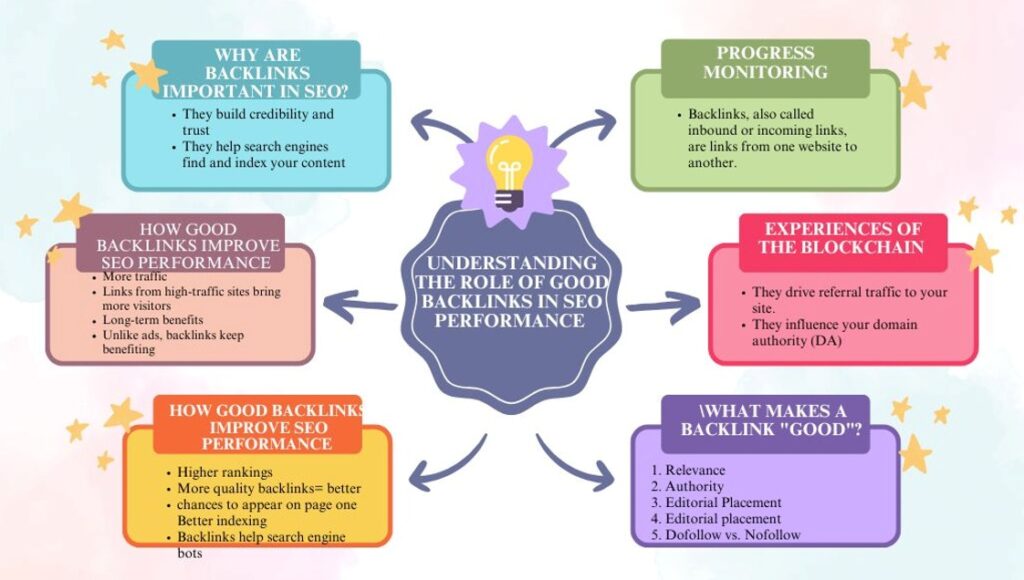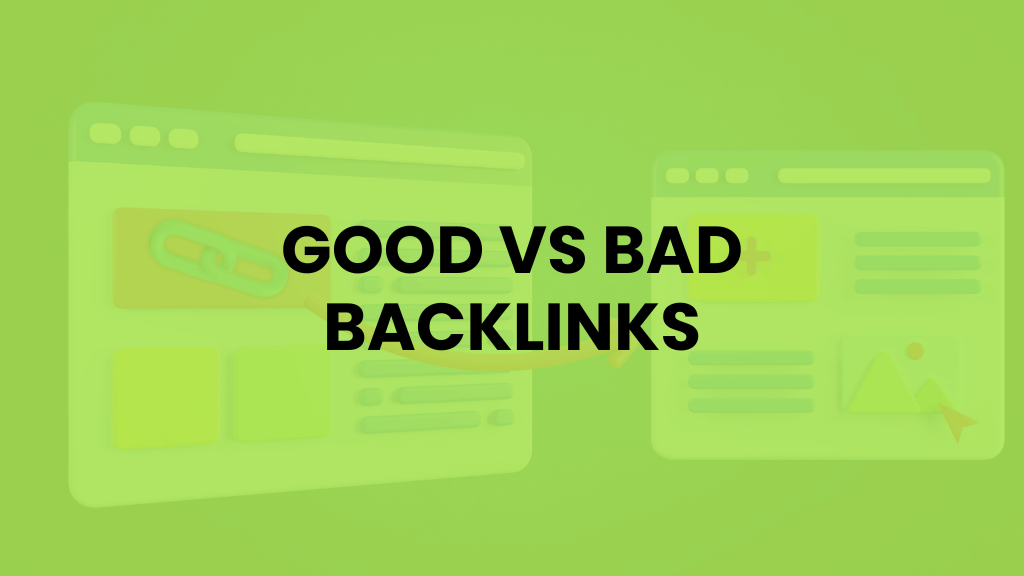Search Engine Optimization (SEO) is about making your website visible to search engines and users. One major factor that affects this visibility is backlinks. These links can either boost your rankings or damage your visibility. In this article, we’ll explain the characteristics of good backlinks and warn you about bad ones that may hurt your site.
At Kinfotech, we specialize in helping website owners like you build strong SEO foundations. We know the value of high-quality backlinks in driving organic traffic, and we use reliable link-building techniques to help our clients grow.
What Are Backlinks?
Backlinks, also called inbound or incoming links, are links from one website to another. If someone adds a link on their site pointing to yours, that is a backlink. Think of backlinks as “votes” that other websites give your content. The more quality votes you have, the more search engines believe your site is valuable and trustworthy. Good backlinks build your credibility, while bad backlinks can cause penalties from search engines like Google.
Why Are Backlinks Important in SEO?
Google and other search engines use backlinks as ranking signals. A site with more high-quality backlinks usually ranks higher in search results. This is because backlinks help in the following ways:
- They build credibility and trust.
- They help search engines find and index your content.
- They drive referral traffic to your site.
- They influence your domain authority (DA).
- They improve your search rankings organically.
What Makes a Backlink “Good”?
Not all backlinks are equal. Some can even harm your SEO if they come from spammy or low-quality websites.
1. Relevance
Good backlinks come from websites that are relevant to your niche or industry. For example, if you run a fitness blog, a link from a health or workout site is far better than one from an unrelated blog.
2. Authority
The linking site’s authority affects how valuable the backlink is. A link from a high-authority domain like Forbes or BBC is more powerful than one from a new, unknown blog.
3. Editorial Placement
Backlinks placed naturally within content (editorial links) are more effective than those in footers, comments, or ads. Search engines trust links that appear within well-written articles.
4. Anchor Text
Anchor text is the clickable text in a hyperlink. A good backlink uses relevant, keyword-rich anchor text that tells search engines what the linked page is about without keyword stuffing.
5. Dofollow vs. Nofollow
Good backlinks are typically dofollow, meaning they pass on link equity. While nofollow links don’t pass SEO value, they can still drive traffic and increase exposure.
What Are Bad Backlinks?
Bad backlinks are harmful and can lower your rankings. These include:
1. Spammy Sources
Links from low-quality or irrelevant sites, often generated automatically or sold in bulk.
2. Irrelevant Sites
Links from pages unrelated to your content confuse search engines and dilute trust.
3. Link Farms and PBNs
Private Blog Networks (PBNs) and link farms exist solely to manipulate SEO and are flagged by Google.
4. Paid Links
Buying backlinks is against Google’s guidelines and risks manual penalties.
5. Over-Optimized Anchor Text
Using the exact same keyword repeatedly looks unnatural and spammy.
Types of Good Backlinks
Let’s explore the most trusted types of backlinks that improve SEO:
1. Guest Post Backlinks
We write content for reputable websites in your industry and include backlinks to your website. This builds authority and reaches new audiences.
2. Editorial Backlinks
These are links you earn naturally when someone finds your content valuable and links to it. Creating original, helpful, and data-rich content helps earn these links.
3. Business Profile Backlinks
Creating profiles on trusted platforms like Google My Business, LinkedIn, or Yelp also gives your site quality backlinks.
4. Resource Page Links
Some websites curate resource pages that list valuable tools and articles. We reach out and suggest your content if it adds value to their readers.
5. Local and Niche Directory Links
Listing your site in relevant local directories or industry-specific directories can help improve local SEO and provide useful backlinks.
Examples of Bad Backlink Sources
- Comment spam on blogs
- Unmoderated forums or Q&A sites
- Adult/gambling/pharmaceutical websites
- Sites with high spam scores (per Moz or Ahrefs)
- Free-for-all link exchanges
How Good Backlinks Improve SEO Performance
The main reason why backlinks matter is because they increase your Domain Authority (DA) and Page Authority (PA). These are scores search engines use to predict how well your pages will rank. Here’s how good backlinks benefit us:
- Higher rankings: More quality backlinks = better chances to appear on page one.
- More traffic: Links from high-traffic sites bring more visitors.
- Better indexing: Backlinks help search engine bots discover your pages faster.
- Long-term benefits: Unlike ads, backlinks keep benefiting your site over time.
How Bad Backlinks Harm SEO
- Lower domain authority
- Trigger penalties or deindexing by Google
- Reduce keyword rankings
- Increase bounce rate due to irrelevant traffic
- Damage your site’s trustworthiness
Common Mistakes to Avoid in Link Building
It’s important to avoid low-quality backlink practices. Here are some common errors we help our clients avoid:
1. Buying Links
Buying links violates Google’s Webmaster Guidelines. These links are often from shady sources and can result in penalties.
2. Linking from Irrelevant Sites
A backlink from a random or unrelated website doesn’t help and might even hurt your SEO.
3. Overusing Exact Match Anchors
Using the exact same keyword every time in your anchor text looks spammy. We vary anchor text naturally for better results.
4. Ignoring Internal Linking
While external backlinks are important, internal links between your own pages help spread link equity and improve SEO.
How We Build Good Backlinks for Our Clients
We follow a white-hat strategy to ensure long-term SEO success. Our process includes:
1. Keyword and Competitor Research
We start by researching what keywords your competitors are ranking for and where their backlinks come from.
2. Outreach to High-Authority Sites
We contact websites, bloggers, and industry influencers with personalized messages to earn links for your content.
3. Creating Link-Worthy Content
We develop high-quality content such as guides, blogs, and infographics that naturally attract backlinks.
4. Monitoring and Auditing
We regularly audit your backlink profile using tools like Ahrefs or SEMrush to remove harmful links and track performance.
How to Check If You Have Good Backlinks
To find out if your backlinks are good, we recommend tools like:
- Ahrefs: For checking domain rating, backlink type, and anchor text.
- Moz Link Explorer: For domain authority and spam score.
- Google Search Console: For seeing which sites link to your pages.
- SEMrush: For detailed backlink audit reports.
These tools help us keep your link profile clean and effective.
How Long Do Backlinks Take to Work?
Backlinks don’t show results overnight. Based on our experience:
- Week 1-2: Search engines discover new backlinks.
- Week 3-5: Your ranking starts to shift slightly.
- Month 2-3: You begin to see significant ranking improvement and traffic increase.
- Month 4+: Consistent growth as domain authority improves.
With regular backlink building, your SEO results become more stable and sustainable.

FAQs
No. Backlinks from spammy or irrelevant sites can hurt your rankings. Focus only on quality links.
Yes, but it takes time, research, and outreach. Many businesses hire experts like us to handle it efficiently.
These are usually nofollow links, so they don’t pass SEO juice but still help drive traffic and build awareness.
It depends on your competition and niche. Some niches need hundreds; others need only a few powerful ones.
Conclusion
The real secret to SEO success is not getting the most backlinks so it’s about getting the best backlinks. We believe that building a strong, natural backlink profile is one of the most powerful ways to grow your website in the long term.
Whether you’re just starting out or trying to outperform competitors, our expert team can help you gain good backlinks that boost your rankings, increase traffic, and build online authority.
Want to learn more or start building your link profile today? Contact us for a tailored SEO plan that works.


